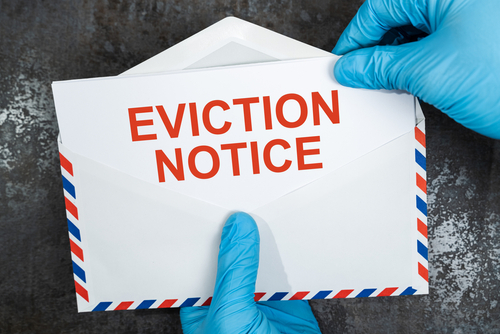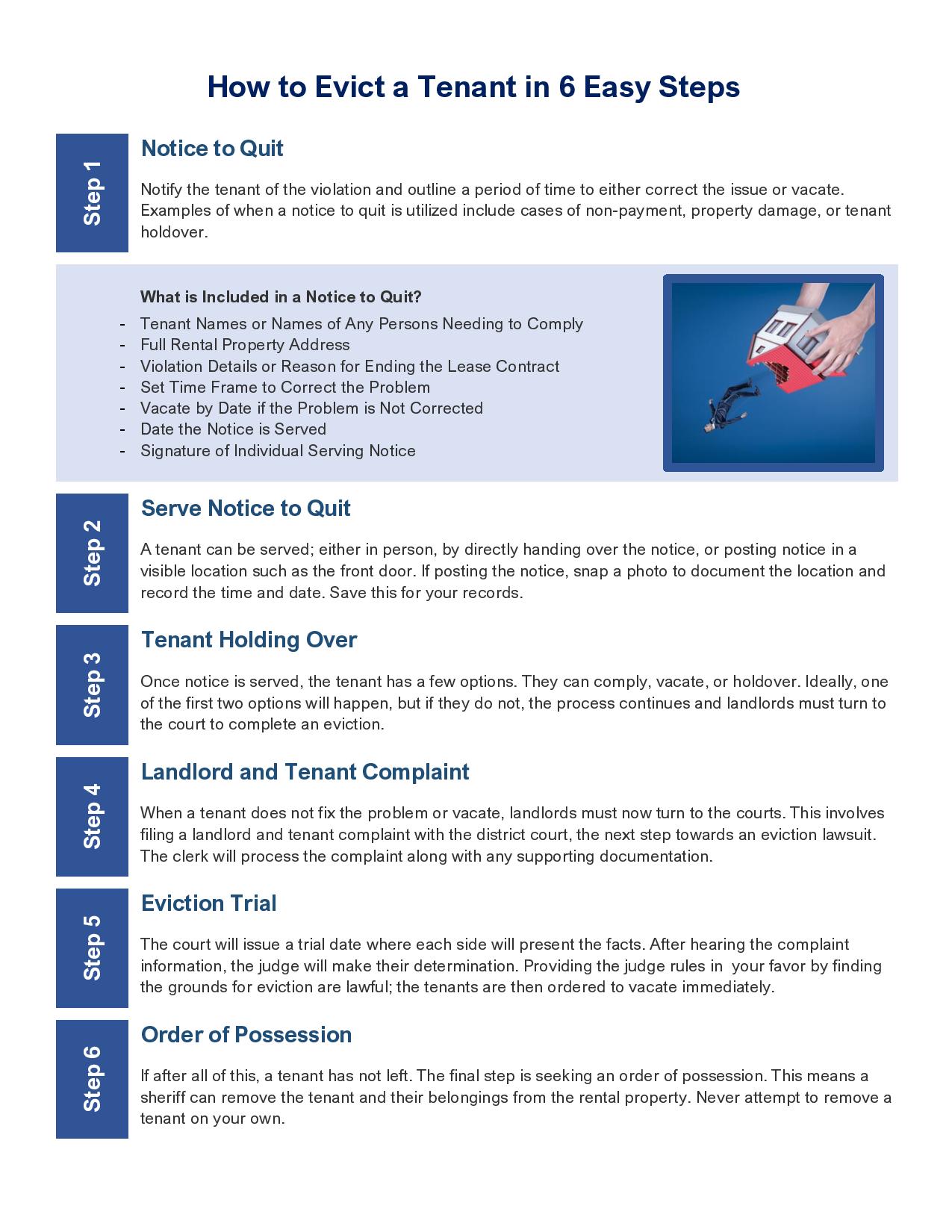
The effects of the COVID-19 pandemic still weigh heavily on landlords’ minds and wallets across the country. Here in Maryland, as courts resume activity, keeping up with the many changes is not easy. Landlords seeking an eviction may find themselves easily overwhelmed by additional paperwork needed, eligibility concerns, and changing filing dates. Below we outline the steps for eviction plus new COVID evictions updates every Maryland landlord should know.
What are the Types of Evictions?
Before we jump into the process of evictions, let’s take a quick look at the types of eviction. The reasons below are the lawful circumstances in which a landlord can pursue removing a tenant through the eviction process.
- Failure to Pay Rent – This is the most common of all eviction complaints. Just like it sounds, this occurs when a tenant falls behind or refuses to pay the contracted rent.
- Holding Over – Once the tenant’s lease expires, and no renewal is offered or agreed upon, they must vacate. When they do not vacate, this is considered holding over, and landlords must remove the tenant by eviction.
- Lease Violations – When the terms of the written lease contract are not adhered to, a landlord notifies the tenant of the violation. If the situation persists or involves serious violations, landlords might seek to evict the tenant through a court order.
- Wrongful Detainer – Wrongful detainer involves occupants that do not have a lease contract with the landlord. This could be a guest, family member, or any other unauthorized persons residing in the property. When this occurs, property owners must use the court system to evict the occupant.
What is the Process for Eviction?
Even with safeguards in place, evictions are a necessary part of the rental property industry from time to time. Property owners must stay abreast of local laws and requirements, especially in the aftermath of COVID. Successful evictions almost always come down to preparation and thorough documentation on the part of the landlord. With that in mind, continue reading as we walk through the standard steps to the eviction process.

Steps to Eviction
- Notice to Quit
- Serve Notice to Quit
- Tenant Holding Over
- Landlord and Tenant Complaint
- Eviction Trial
- Order of Possession
Notice to Quit
Once a need arises to remove a tenant for one of the four eviction reasons, the first step is issuing a notice to quit. The idea is to notify the tenant of the violation and outline a period to either correct the issue or vacate. Examples of when a notice to quit is utilized include cases of non-payment, property damage, or tenant holdover.
What is Included in a Notice to Quit?
- Tenant Names or Names of Any Persons Needing to Comply
- Full Rental Property Address
- Violation Details or Reason for Ending the Lease Contract
- Set Time Frame to Correct the Problem
- Vacate by Date if the Problem is Not Corrected
- Date the Notice is Served
- Signature of Individual Serving Notice
Serve Notice to Quit
After a notice has been prepared, it must be served to the tenant. There are two ways a tenant can be served; either in person, by knocking and directly handing over the notice, or simply posting the notice in a visible location on the property such as the front door. For landlords, keeping a record of this transaction is vital. So, if posting the notice, snap a photo, document the location, and record the time and date. Save this information for your records.
Helpful Tip: Did you know the courts have updated the Failure to Pay Rent Filing Form? As of October 1, 2020, the new form is required, and you can find it here.
Tenant Holding Over
Once notice is served, the tenant has a few options. They can choose to comply, vacate, or holdover. Ideally, one of the first two options will happen, but if they do not, the process continues.
Landlord and Tenant Complaint
When a tenant has been served and does not fix the problem or vacate, landlords must now turn to the courts. This 6 Easy Steps to Evict a Tenantinvolves filing a landlord and tenant complaint with the district court, the next step towards an eviction lawsuit. The clerk will process the complaint along with any supporting documentation.
Eviction Trial
As the next step, the courts will issue a trial date in which each side will have the opportunity to present the facts. This is where attention to detail and impeccable record keeping becomes essential for success as the landlord. After hearing the complaint information, the judge will make their determination. Providing the judge rules in your favor by finding the grounds for eviction are lawful; the tenants are then ordered to vacate immediately.
Order of Possession
Even after all of this, some tenants still may not leave. Therefore, we move to the last and final step, seeking an order of possession. Having this in hand means a sheriff can now remove the tenant and their belongings from the rental property. That said, never attempt to remove a tenant on your own forcibly. This can result in a potentially dangerous situation and an unlawful one where landlords can face the consequences.
How COVID-19 is Affecting Evictions?
As life slowly returns to normal and courts reopen, changes are bound to happen. In Maryland, COVID-19 has raised many questions among landlords unsure of steps to take, questions surrounding the eviction stay orders, and when they can file. Below we answer some of those key questions to make sure landlords are prepared to resume normal operations.

Is There Still a Hold on COVID Evictions?
There was previously a hold on evictions, which has lifted as of July 25, 2020. So, landlords may resume filing evictions through the district courts. Additionally, if an eviction was scheduled before the state of emergency orders, those may now be carried out.
Are All Types of Eviction Cases Being Heard?
Yes! As of the dates below, courts are hearing new eviction complaints on the following:
- July 25, 2020 – Breach of Lease, Tenant Holding Over, and Wrongful Detainer
- August 31, 2020 – Failure to Pay Rent
Does the Federal CARES Act Affect My Eviction Proceedings?
If cases were filed prior to August 25, 2020, possibly! There are a few new regulations that may impact an eviction for failure to pay rent. The CARES Act applies to federally backed properties, either through mortgages and subsidized housing and any rental units where the owner received mortgage leniency. The courts previously required landlords to file a Declaration of Compliance Form along with any non-payment of rent cases, but that requirement has now lifted.
What is the CDC Agency Order, and How Does it Affect COVID Evictions?
The Centers for Disease Control and Prevention (CDC) has issued a protection order protecting tenants that meet certain criteria from eviction. This means that a tenant who successfully establishes this defense is safe from eviction until December 31, 2020, unless the order is extended. That said, a judge will still evaluate an amount due but will hold judgment until the CDC order is lifted. Once lifted, the court may enter a judgment for possession. However, it is up to the landlords to continue informing the court of any payments made while the case is pending, or judgment is reserved.
Criteria for Protected Individuals Under the CDC Order
- Eviction means the tenant is now homeless or is forced to move into crowded conditions with others
- Earned income is below $99,000 for individuals or $198,000 for joint parties
- Tenants lost income, work, or had extraordinary medical expenses
- Every effort was made to receive rental assistance through other government programs
- Best efforts were made to make partial and timely payments when possible
Additional information and the complete CDC Eviction Halt Order is online.
Essential Eviction Tips to Remember
As regulations change, landlords may want to go it alone when it comes to eviction. However, this is a complex legal process that requires attention to detail, knowledge of the local requirements, and diligent follow up. To ensure success throughout the various steps, follow the advice and tips below.
- Stick to Legal Evictions – We discussed above the four types of evictions property owners may pursue. So, anything outside of these, such as retaliatory evictions, could prove detrimental and costly to a landlord.
- Do Not Attempt Self Help Evictions – Along with being potentially dangerous, it is illegal. Eviction is a lawful process carried out through the courts. Any attempt to forcefully remove, threaten, or intimidate a tenant will only cause you more harm than good.
- Follow the Requirements – The eviction process has certain requirements for serving notice along with various paperwork involved. As a landlord, strictly adhering to these rules is essential to being successful in your case.
- Hire Professionals – A professional property management company is a landlord’s best asset when it comes to evictions. The extensive knowledge and industry know-how they provide is invaluable when handling procedures with so much at stake.
Conclusion
No one is sure how long landlords will feel the effects of the COVID-19 pandemic. However, things are slowly beginning to return to normal, including court proceedings to deal with COVID evictions. Feeling overwhelmed trying to keep up with the new requirements and ever-changing updates? Eviction is a costly process, even more so when landlords are unprepared and subsequently unsuccessful. The best defense against costly eviction mistakes is to turn to a professional property management company with the experience to get the job done. Bay Property Management Group cannot only help owners successfully navigate the complicated eviction process but every aspect of your rental property needs. Give us a call today to see what our dedicated team can do for you!

